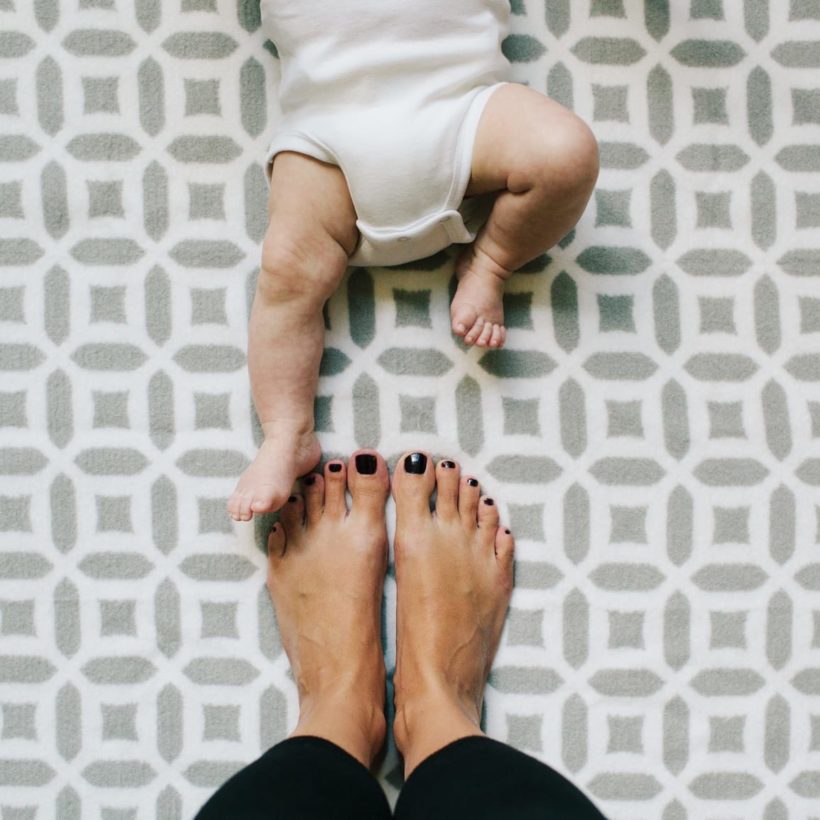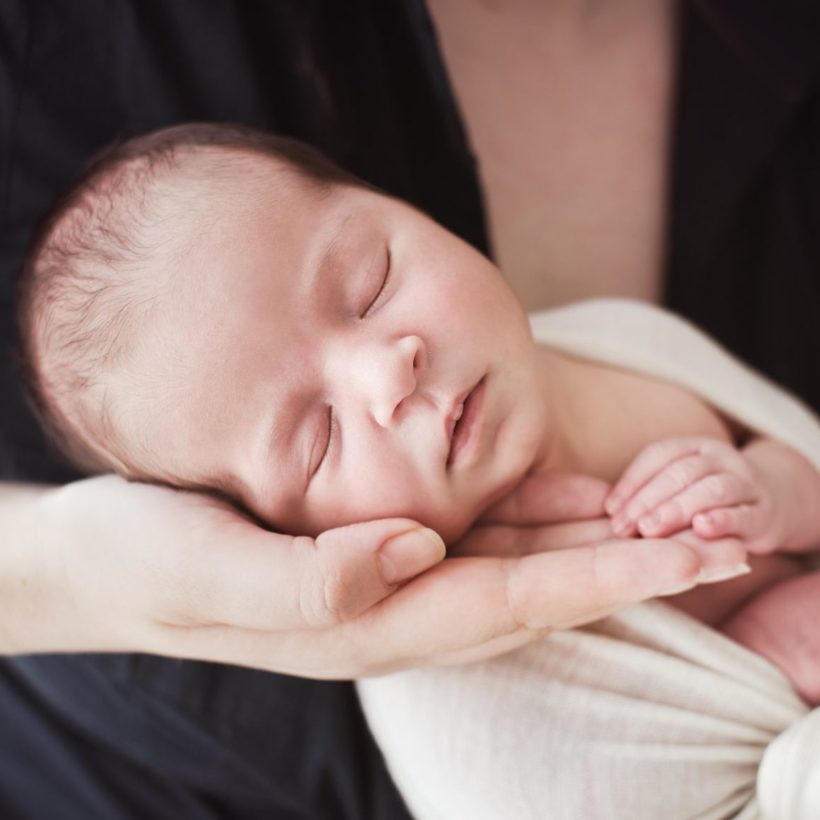Navigating motherhood is not for the faint of heart. There are countless moments we question ourselves, “Did we do the right thing?” “Was that the right advice?” “Will they be okay?” It pretty much never ends.
If you have a pre-existing mental health diagnosis, things can be even more complex. You’re navigating your mental health struggles and the needs of your child (or children).
I’ve found talking to other moms about their experiences and coping skills extremely helpful in navigating my own, and I wanted to share two women’s stories with you.
Christine is a west coast-based stay-at-home mom and the voice behind Something Small SoCal, where she tackles everything from style to motherhood. Alexandra Helene is a New Jersey-based working mom and beauty expert. Both are eager to share their experiences and advice, hoping it will help other moms out there.

What is your story?
Christine: I suffer from general anxiety and obsessive-compulsive disorder (OCD). I have struggled with anxiety for well over 15 years, and OCD reared its ugly head after my grandfather’s death when I was eight years old. My parents took me to therapy, and I am so grateful for it because without knowing it, I learned how to manage my compulsions and neurosis. My biggest struggles are with my anxiety. More often than not, I fear something going wrong, intrusive thoughts, constantly worrying something will happen to my son, and always, ALWAYS seeking reassurance. My four-year-old son is my world, so now my anxiety knows that, and I am triggered by anything that could have to do with him.
Alexandra: I have had anxiety since I was a young kid but was not officially diagnosed with it until last year when I started seeing a therapist postpartum. I wish I hadn’t waited so long to seek out professional help because it’s truly the best thing I’ve ever done for myself. It made me realize how much of the self-talk inside my head is driven by my anxiety, and the combination of being aware of it and now having someone to talk through it with every week has been game-changing.
What does it look like or feel like?
Christine: I have to check his room at night to make sure he is okay — this is my OCD. I make sure his closet light is off and that his outlets are ok because I have an irrational fear of fire.
My anxiety makes me short-tempered and sometimes leaves me with little to no patience. Because of my illness, I always worry about what is to come or what could happen rather than living in the moment, and I feel I have missed so much. At its worst, it is a constant state of fear and worry that has only recently been properly managed by medication. I have been taking Zoloft for about nine months, and for me, it has been life-changing.

Alexandra: It takes different shapes and forms, depending on the situation. Sometimes it’s a physical reaction — I feel sick to my stomach, and I cannot shake off the feeling that I’m unsafe or alone, even when both things couldn’t be further from the truth. Other times it’s humming along in the background of everyday life — like this constant feeling of being on edge. It’s awful, but sadly, I think it’s ingrained in how I function — usually without realizing it.
Have you spoken about it to your children?
Christine: I have not directly spoken to my son about it, but I fear he’ll inherit this from me. I will speak to him about it when I feel he is old enough to understand. I want him to understand that mental health is just as important as physical health, and I will always be there to help him with whatever he needs.
Alexandra: My son is only a year old, but my husband and I already feel strongly that mental health and wellness will be a constant topic of discussion in our household. We want our son to know that it’s okay to feel all the emotions and you don’t always need to feel happy. Our house will always be a safe space for him to discuss his emotions and mental health in a non-judgmental environment. And yes, I plan to share my struggles with anxiety when the time is right. I want him to know it’s common and it’s something worthy of addressing and caring for him the same way we would with a physical ailment.
How has motherhood affected your symptoms?
Christine: Regarding motherhood and my anxiety and OCD, they don’t exactly mix well. My patience is constantly tested for sure. Toddlers will test your patience no matter what, but constant anxiety leads me to be short-tempered and, embarrassingly enough, mean to my son sometimes.

There would be times when we were rushing to get ready for school, and he was fooling around, and I was so worried about being five minutes late because of how it would affect the rest of my day. I would lose my temper and yell at him when he was attempting to get dressed by himself and was taking too long. It often happened when he wasn’t doing what I wanted when I wanted. I was so overcome with anxiety I would yell, and he would get scared. It would break my heart. He didn’t and doesn’t understand, he sees mommy being mean. But, there has been much improvement with meds.
Also, COVID-19 has taken a toll on my anxiety, and there was a time when I wouldn’t even take him to a playground for fear of getting sick. My fear has caused him to miss out on many activities and adventures in the past almost two years.
Alexandra: I struggled with postpartum “low mood” — it was never technically diagnosed as depression — but surprisingly did not experience much postpartum anxiety. Still, the first few months after giving birth were some of the most challenging times I’ve ever experienced in my overall mental health. I was having nightmares and intrusive thoughts. I was running on very little sleep and struggling with breastfeeding, which affected my feeling of self-worth. It was a lot. However, once my son turned four months, everything shifted a bit, and I’ve been feeling much better ever since. I can honestly say it took me a full year after giving birth to finally say, “I feel like me again.” I still have anxiety, but I’m still going to therapy to manage it, and I’m so busy being a mom and working that I’m able to be more present these days, which has helped my anxiety take a bit of a back seat.
What’s your best advice to other moms managing motherhood and mental health?
Christine: Give yourself grace, ask for help, take some time for yourself; and for me personally, going back on medication was a must. Moms should know that it’s okay not to be okay – but there is help out there.
It was life-changing once I finally admitted it to myself and pulled the trigger on medication. My anxiety is not cured by any means, but I have a better handle on it. I now have so much more patience and am more present than I was.
 Alexandra: Prioritize your mental health because it impacts everything. That phrase, “you can’t pour from an empty cup,” is so true, and moms tend to give everything we have to our kids and forget that we need to care for ourselves, too. Don’t be afraid to ask for help. Find a group of local moms you can lean on for support, reach out to a mental health professional if you feel you would benefit from that kind of care, and be direct with your partner in what you need from them. And lastly, practice being kind to yourself and giving yourself grace daily.
Alexandra: Prioritize your mental health because it impacts everything. That phrase, “you can’t pour from an empty cup,” is so true, and moms tend to give everything we have to our kids and forget that we need to care for ourselves, too. Don’t be afraid to ask for help. Find a group of local moms you can lean on for support, reach out to a mental health professional if you feel you would benefit from that kind of care, and be direct with your partner in what you need from them. And lastly, practice being kind to yourself and giving yourself grace daily.







